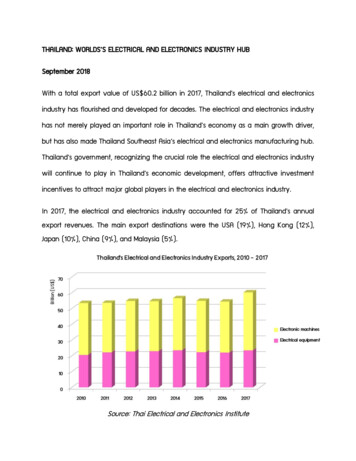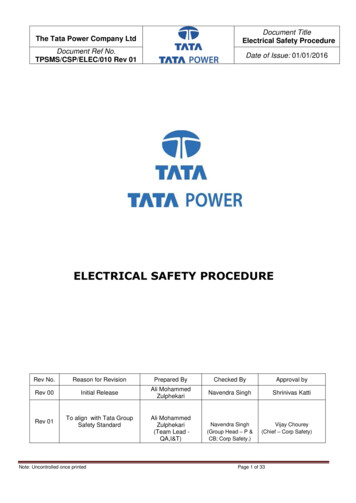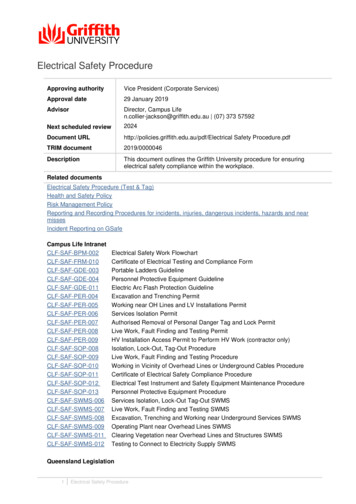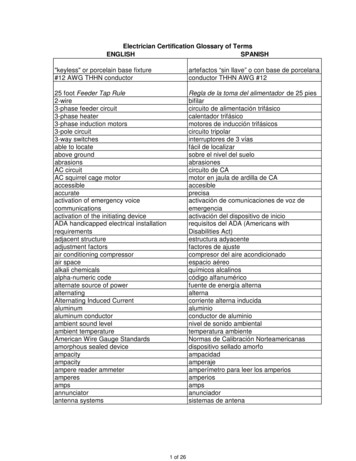
Transcription
THAILAND: WORLDS’S ELECTRICAL AND ELECTRONICS INDUSTRY HUBSeptember 2018With a total export value of US 60.2 billion in 2017, Thailand’s electrical and electronicsindustry has flourished and developed for decades. The electrical and electronics industryhas not merely played an important role in Thailand’s economy as a main growth driver,but has also made Thailand Southeast Asia’s electrical and electronics manufacturing hub.Thailand’s government, recognizing the crucial role the electrical and electronics industrywill continue to play in Thailand’s economic development, offers attractive investmentincentives to attract major global players in the electrical and electronics industry.In 2017, the electrical and electronics industry accounted for 25% of Thailand’s annualexport revenues. The main export destinations were the USA (19%), Hong Kong (12%),Japan (10%), China (9%), and Malaysia (5%).Source: Thai Electrical and Electronics Institute
ELECTRICAL APPLIANCE INDUSTRYThailand is one of ASEAN’s largest production centers in the electrical appliances sectorand globally recognized for its manufacturing competency. Besides being the world’s 2ndlargest producer of air conditioning units, Thailand’s expertise in refrigerator production isworld class. In 2017, Thailand’s electrical appliance exports were valued at US 23.7 billionand electrical appliance imports totaled US 15.1 billion.Source: Thai Electrical and Electronics InstituteProof of Thailand’s attractiveness is evident in the many global electrical appliancemanufacturers that already have plants in the Kingdom, including: Bosch & Siemens,Daikin, Electrolux, Fisher & Paykel, Haier, LG, Panasonic, Samsung, and Toshiba.The major export destinations for Thailand’s electrical appliances in 2017 were USA, Japan,Vietnam, China, and Hong Kong. USA was the largest export market with total value ofUS 3.7 billion in 2017.
ELECTRONICS INDUSTRYIn 2017, Thailand’s overall trade in the electronics industry alone was worthapproximately US 71 billion, with export revenues accounting for almost US 37 billion.Source: Thai Electrical and Electronics InstituteIn 2017, Thailand’s main electronics exports were electronic hardware componentsnd(including hard disc drives) and integrated circuits (IC) Thailand is now the 2largestHDD exporter and producer in the world. At the same time, Thailand holds an equallyrenowned reputation in the IC and semiconductor sectors due to Thailand being one ofthe main manufacturing bases for these products in the ASEAN region.Companies that have already taken advantage of Thailand's dynamic industry includeworld-class companies: Fujitsu, LG Electronics, Seagate, Sony, Samsung and WesternDigital.
Thailand's electronics industry, embracing the new digital age boon, has seen exportsrise to US 36.75 billion in 2017. The primary markets for these exports were the USA(21%), Hong Kong (16%), China (11%), Japan (9%) and Netherland (6%). Increasingdemand for electronics saw imports rise to US 34.83 billion with mainly printed circuitsand IC being imported to supply Thailand's increasingly advanced electronicsmanufacturing ecosystem.Data Storage and Hard Disk Drives (HDD)ndThailand is the 2 largest global producer and exporter of hard disk drives. In 2017,Thailand’s data storage devices including HDD exports totaled approximately US 6.67billion and grew by 8.97% from 2016.The competitiveness of Thailand’s HDD industry is based on its world class industrial clusterscontaining supporting industries that manufacture most of the components utilized in theassembly of HDDs.Integrated circuits (IC)Integrated circuits are Thailand’s largest electronics import and second largest electronicsexport. According to Thai Electrical and Electronics Institute, the value of ICs importedinto Thailand in 2017 reached over US 11 billion and exports reached US 8.3 billion.Ranked in order of importance, the major export markets for Thailand’s ICs in 2017 are:Hong Kong, China, USA, and Singapore. The continued miniaturization of electronicdevices ensures increased demand for integrated circuits and profitable opportunities inThailand for investors.OPPORTUNITIES
IC and Data StorageIntegrated circuits are an integral component of smartphones, a now ubiquitousmarket. The arrival of next generation web connected electronics, wearable devices andInternet of Things (IoT) devices, means integrated circuits will continue to see increasedgrowth and greater demand. The global integrated circuit market is forecast to reachUS 379 billion in 2019 due to the increasing blending of everyday devices with Internetconnectivity.Although Thailand’s electronics market is well developed, the production of integratedcircuits remains an opportunity for manufacturers. Integrated circuits still are importedmainly from China, Japan, the USA, Singapore, and China. In 2017, Thailand imported overUS 11 billion worth of integrated circuits. In addition, IC design and related activitiesoffers a burgeoning field of opportunity, particularly in wafer design.Technological innovations in the consumer and enterprise sectors have producedthe next generation of HDD and newer data storage techniques such as Solid State Drives(SSD) and Solid State Hybrid Drives (SSHD). Decades of experience in data storagetechnology and expertise derived from its years as a central hub of data storageproduction makes Thailand an ideal location for the production of next generation datastorage solutions.RFIDThailand’s prowess at electronics reaches the radio-frequency identification (RFID)technology industry as well. RFID technology is playing an increasingly important role invarious industries worldwide, from organizing warehoused inventories to tagginglivestock. The RFID Institute, a joint public-private sector research institute was
established in 2009 as a test bed center working with private companies to design stateof the applications and technologies for various industries including: security, logistics,healthcare, retail, and transportation.Automotive ElectronicsElectronics and electronic systems have improved a range of automobile elementsincluding safety, fuel efficiency, performance, and comfort. Furthermore, the current trendsof alternative fuel vehicles, increased fuel efficiency, and stricter emissions standards, areincreasingly spurring demand for automotive electronics. The value of global automotiveelectronics is forecast to reach US 314.4 billion within 2020.The need for cutting edge automotive electronics has dramatically increased in order tosatisfy the demand for “smart” vehicles. Automotive electronics companies that alreadyhave established a presence in Thailand include Calsonic Kansei, Delta Electronics, HitachiAutomotive Systems, Omron Automotive Electronics and Sumitomo Electric Wiring Systems.WHY THAILAND?Competitive workforce: Currently, over 600,000 people are employed in Thailand’selectrical and electronics sector. Foreign investors are often drawn to Thailand due to thecost effective, highly skilled workforce. Over 60 public and private engineering institutesacross the country are accredited by the Council of Engineers.To ensure a stable pool of qualified workers for the industry, there exists an intricatenetwork of research centers and institutes that offer resources for technical training. Forinstance, there is the National Science and Technology Development Agency, NECTEC’sIndustry/University Cooperative Research and Development Units, King Mongkut’s
University of Technology, Asia Institute of Technology, King Mongkut’s Institute ofTechnology, and Khon Kaen University.“Seagate continues to invest in Thailand for three reasons - it has strong teams, bothtechnical and operating, Asia is a high-growth market for data storage, and the coststructure for professionals, both engineers and technicians, is still good. Thailand is ina great location with good logistics to access other countries in Asia, especially Chinaand India, as well as the rest of the world.”-Mr. Jeff Nygaard, Senior Vice President ofGlobal Head Operations at Seagate TechnologyAccess to markets: In order to enhance global commerce opportunities, Thailand hasbilateral free trade agreements with many countries, including Japan, India, China, Australia,and New Zealand. Thailand is also currently in the process of establishing free tradeagreements with the European Union, Canada, Turkey, and Chile. As a member of ASEAN,Thailand participates in multilateral free trade agreements with China, South Korea,Australia, New Zealand, India, and Japan. Furthermore, the establishment of the ASEANEconomic Community (AEC) in 2015 fully integrates this US 2 trillion regional market intothe global economy. This new economic bloc with streamlined movement of goods,services, and investment capital will provide unparalleled opportunities for manufacturers.Excellent logistics systems: Thailand is a transportation hub of the ASEAN region. Thecountry provides world-class infrastructure along with cost effective logistics. Thailand’sextensive road and rail networks span the Kingdom, facilitating access to nearbycountries.Bangkok's Suvarnabhumi International Airport and Laem Chabang deep-sea
port are globally recognized gateways of global logistics. Thailand offers manufacturers ageographically accessible and logistically convenient location.Electronics clusters: The establishment of electronic clusters has been a key method ofleveraging the capabilities of firms that comprise Thailand’s electronics industry.Proximity between firms and their input suppliers within the clusters enhancescommunication and facilitates flow of goods while providing an environment thatpromotes technology innovation and improved efficiencies. Another attractive aspect ofthe electronics cluster is streamlined supply chain management, which allows for reducedlogistics costs. Manufacturers also benefit from shared core technological innovations andhuman resource development programs.DEVELOPED NETWORK OF SUPPORTING RGANIZATIONSGovernment organizations supporting the growth and competitiveness of theelectrical and electronics industry in Thailand include the Electrical and ElectronicsInstitute (EEI), National Electronics and Computer Technology Center (NECTEC), ThaiOrganic and Printed Electronics Innovation Center (TOPIC), and Thai Embedded SystemsAssociation.ATTRACTIVE INVESTMENT INCENTIVESThailand Board of Investment offers a wide range of tax and non-tax incentives forinvestments in a variety of activities. Tax-based incentives include exemption orreduction of import duties on machinery and raw materials, and corporate income taxexemptions and reductions. Non-tax incentives include permission to bring into theKingdom skilled workers and experts to work in investment promoted activities, to ownland and take or remit foreign currency abroad. Additionally, foreign businesses
are entitled to 100% ownership for manufacturing and some services sectors such asaircraft service and maintenance.Recognizing the importance of the electronics and electric appliance industry in Thailand’sfuture technological development, the BOI has classified electronics design and embeddedsoftware as priority activities of special importance and benefit to the country. As such,projects receive an uncapped eight-year corporate income tax exemption, exemptionfrom import duties on machinery and raw materials used in manufacturing export products,regardless of location. Projects in these activities are also eligible to receive other non-taxincentives.Additional information about specific manufacturing activities relating to electrical andelectronics sector can be found on the BOI website or by contacting the BOI’sInvestment Promotion Division 2 and 5.For further information:The Thailand Board of Investment (BOI): www.boi.go.thElectrical and Electronics Institute: www.thaieei.comNational Electronics and Computer Technology Center (NECTEC): www.nectec.or.thElectronic & Computer Employers’ Association: www.eceathailand.comThai Organic & Printed Electronics Innovation Center: www.topic.in.thThai Embedded Systems Association: www.tesa.or.th
the main manufacturing bases for these products in the ASEAN region. Companies that have already taken advantage of Thailand's dynamic industry include world-class companies: Fujitsu, LG Electronics, Seagate, Sony, Samsung and Western . (RFID) technology industry as well. RFID technology is playing an increasingly important role in










